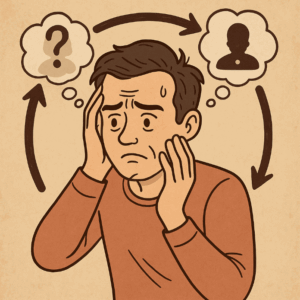🔎 When Curiosity Becomes Compulsion: Understanding Sexual Obsessions in OCD
 It is natural to be curious about sexuality. Everyone has occasional questions, fantasies, or doubts about their sexual feelings. But in some people, these thoughts don’t stop at curiosity — they become persistent, intrusive, and deeply distressing. This is what we call sexual obsessions in Obsessive–Compulsive Disorder (OCD).
It is natural to be curious about sexuality. Everyone has occasional questions, fantasies, or doubts about their sexual feelings. But in some people, these thoughts don’t stop at curiosity — they become persistent, intrusive, and deeply distressing. This is what we call sexual obsessions in Obsessive–Compulsive Disorder (OCD).
These are not a reflection of a person’s true desires or values. Instead, they are ego-dystonic — meaning the thoughts go against who the person is and what they believe.
🧠 Healthy Curiosity vs. Intrusive Doubts
Healthy Sexual Curiosity
-
Wondering about sexual orientation during adolescence or adulthood.
-
Asking questions about intimacy, attraction, or relationships.
-
Exploring sexuality in a way that feels aligned with one’s values.
Intrusive Sexual Obsessions in OCD
-
Persistent, unwanted doubts like “What if I’m attracted to the wrong person?” or “What if I secretly desire something inappropriate?”
-
Mental reviewing, analysing, or checking past events for proof.
-
Feeling extreme guilt, shame, or disgust over the thoughts.
-
Avoiding people, situations, or intimacy due to fear of acting on the obsession.
👉 The difference is that healthy curiosity feels natural and manageable, while OCD-related thoughts feel unwanted, repetitive, and anxiety-provoking.
🔄 The Checking and Reassurance Cycle
Sexual obsessions often trigger a cycle of compulsions:
-
Intrusive Thought → e.g., “What if I’m not straight?”
-
Anxiety Spike → distress, guilt, shame.
-
Checking/Reassurance Seeking →
-
Mentally reviewing past relationships.
-
Looking at people to “test” attraction.
-
Asking friends or therapists for reassurance.
-
Reading about sexuality online compulsively.
-
-
Temporary Relief → anxiety decreases briefly.
-
Rebound Doubt → the thought returns stronger, and the cycle repeats.
This cycle can dominate daily life, relationships, and self-esteem.
✅ Breaking the Loop: How CBT and ERP Help
The most effective therapy for OCD is Cognitive Behavioural Therapy (CBT) with Exposure and Response Prevention (ERP).
-
ERP for Sexual Obsessions
-
Patients are gradually exposed to feared thoughts or triggers (reading about sexual orientation, looking at images, etc.).
-
At the same time, they resist compulsions like reassurance-seeking or checking.
-
Over time, the brain learns that anxiety decreases naturally without rituals.
-
-
Cognitive Therapy
-
Helps patients recognise that intrusive thoughts are just thoughts, not facts.
-
Challenges catastrophic interpretations (“If I think this, it must mean it’s true”).
-
👉 Research shows ERP significantly reduces symptoms in people with sexual orientation OCD, pedophilia obsessions, or other intrusive sexual doubts.
💡 Key Takeaway
Everyone has sexual thoughts and questions. The difference in OCD is that these thoughts are intrusive, unwanted, and stuck in a cycle of checking and reassurance. With CBT and ERP, it is possible to break this loop, reduce anxiety, and live with greater confidence and peace of mind.
👨⚕️ Consultation
I’m Dr. Srinivas Rajkumar T, Consultant Psychiatrist at Apollo Clinic, Velachery, Chennai.
I provide evidence-based treatment for OCD, including intrusive sexual obsessions, using therapy and structured strategies tailored to each individual.
📞 Contact: +91 8595155808